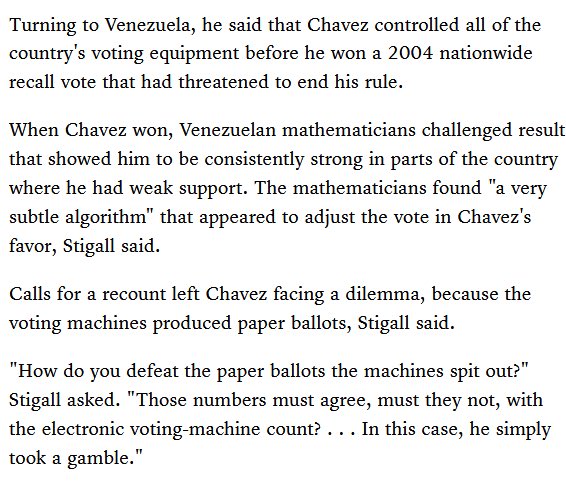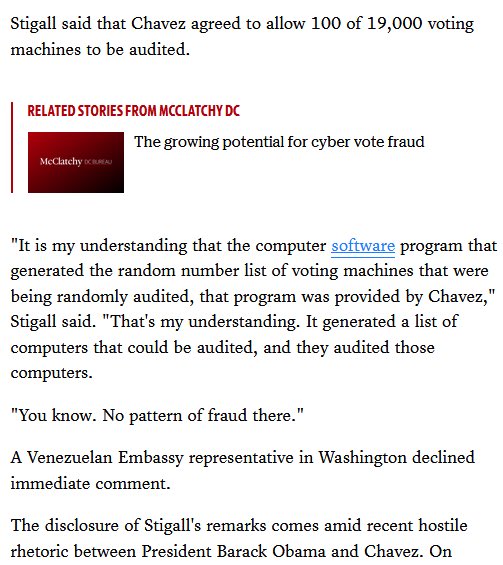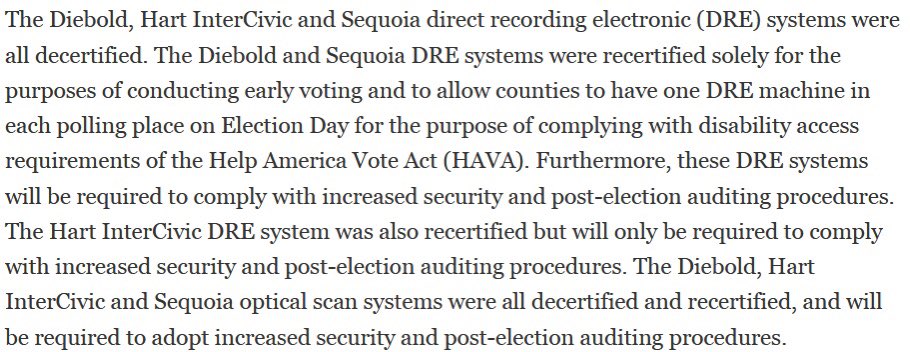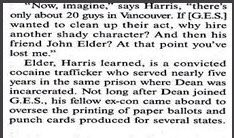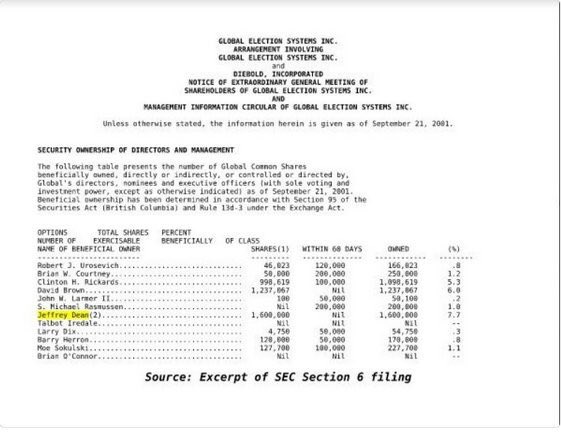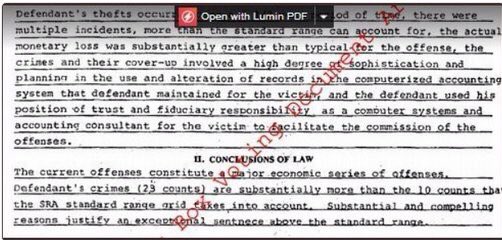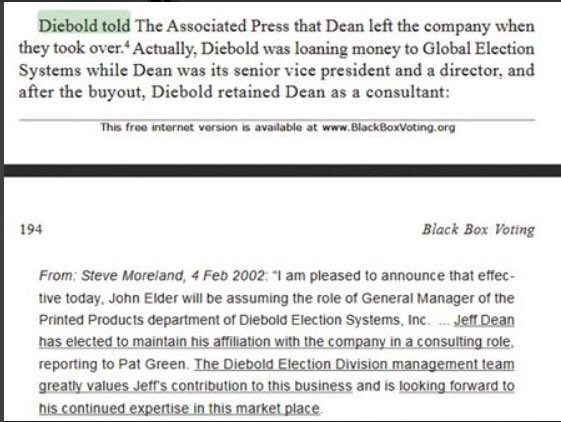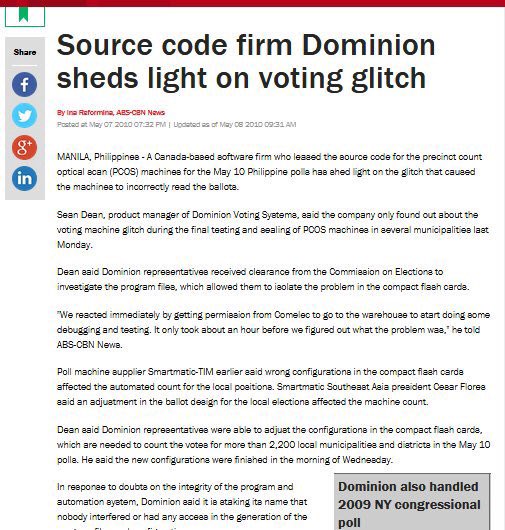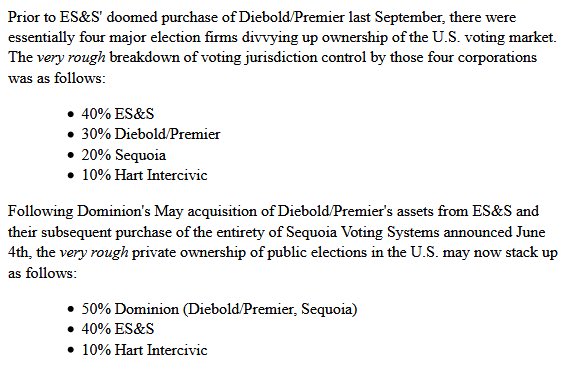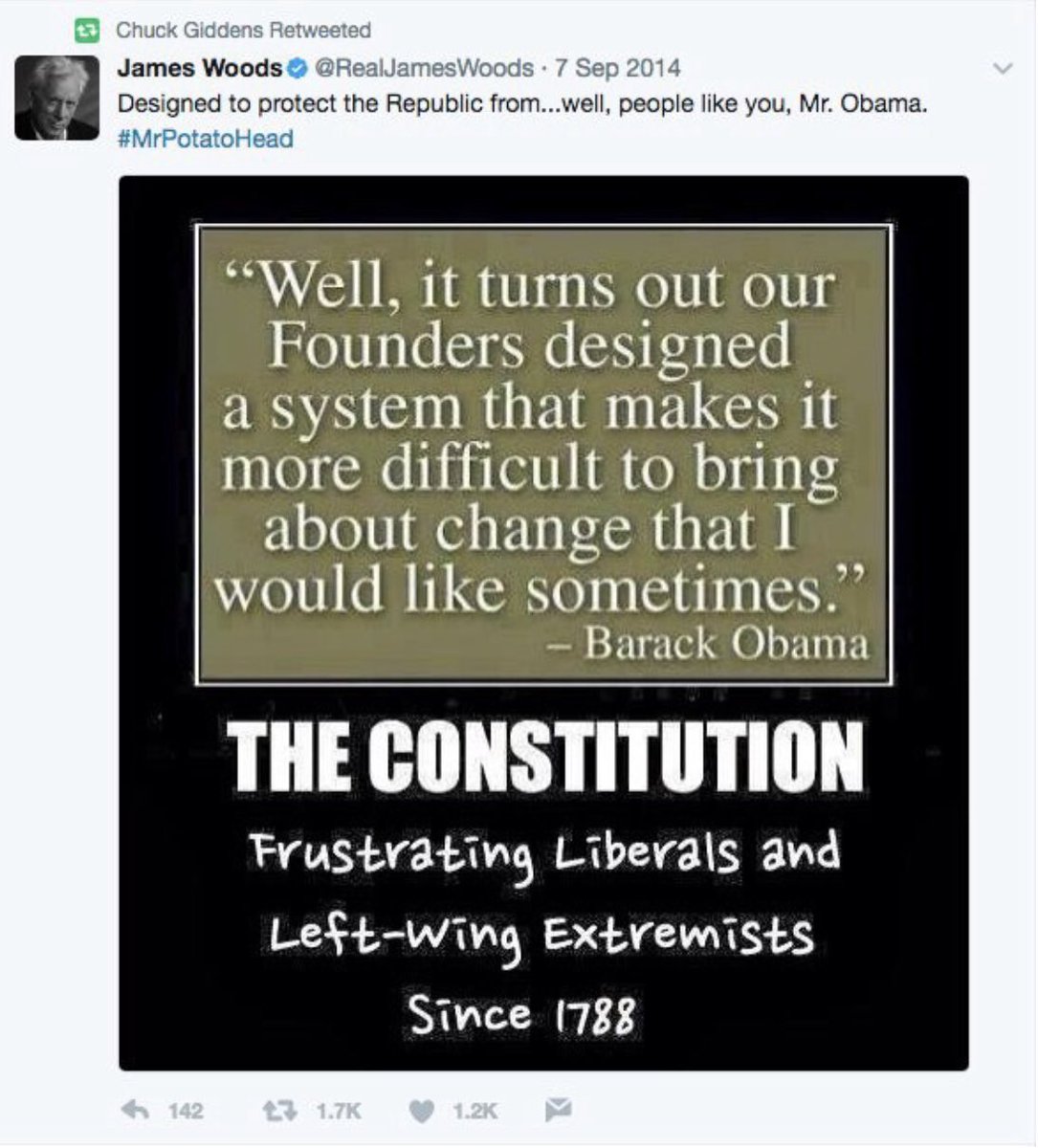States have used taxpayer money to buy systems from vendors such as Dominion, with close past and/or present ties to foreign dictators, US politicians, and convicted embezzlers whose crimes involved computer tampering.
In 2005, Sequoia was acquired by a voting machine firm called “Smartmatic.”
The acquisition raised eyebrows in the because, in 2004, the Hugo Chavez-led Venezuelan government had selected Smartmatic “to provide the voting machines system for the presidential recall election, even though it was the company’s first time providing machines for an election.”
“Smartmatic teamed up with a Venezuelan software company, #Bitza, which at the time was 28 percent owned by Chavez’s government.”
According to the Congressional testimony of a CIA agent, the 2004 election and recount in Venezuela appeared to have been rigged for Chavez. The agent further stated that Chavez controlled all of the voting equipment before the election.
Although not mentioned by the CIA agent, this would have included Smartmatic’s voting machines. http://www.mcclatchydc.com/news/politics-government/article24530650.html
The concerns over Smartmatic’s acquisition of Sequoia triggered an investigation in the United States. http://www.nytimes.com/2006/10/29/washington/29ballot.html
In December 2006, presumably due to the controversy, Smartmatic announced that it had sold Sequoia. https://maloney.house.gov/media-center/press-releases/smartmatic-announces-sale-sequoia-voting-systems
Questions remained as to whether the sale was a sham transaction designed to fool regulators. https://www.nist.gov/sites/default/files/documents/itl/vote/SequoiaSmartmaticReport61208.pdf
In 2007, the California Secretary of State asked the Computer Security Group at U.C. Santa Barbara to analyze the security of Sequoia’s voting machines.
The report found “a number of serious security issues” that “could be exploited by a determined attacker to modify (or invalidate) the results of an election” and that could “be carried out without any knowledge of the source code.” http://votingsystems.cdn.sos.ca.gov/oversight/ttbr/red-sequoia.pdf
An analysis of the source code by UC Berkeley found that “the Sequoia system lacks effective safeguards against corrupted or malicious data injected onto removable media, especially for devices entrusted to poll workers and other temporary staff with limited authority…”
The researchers further found that “Many of the security features of the Sequoia system, particularly those that protect the integrity of precinct results, employ cryptography” that is “easily circumvented.” http://votingsystems.cdn.sos.ca.gov/oversight/ttbr/sequoia-source-public-jul26.pdf
The researchers concluded that “virtually every important software security mechanism is vulnerable to circumvention.” https://www.wired.com/2007/08/ca-releases-sou/
Based on these reports, California withdrew approval for the use of Sequoia machines, but then granted re-approval for the use of Sequoia’s machines subject to various conditions. http://www.govtech.com/security/California-Decertifies-Voting-Machines-Conditions-Applied.html
Thirteen other states continued using Sequoia machines as well. https://www.theverge.com/2012/11/6/3609506/voting-machine-electronic-voting-history-in-america
One of those states was New York, which in 2008 revealed that it had “found problems with 50 percent of the roughly 1,500 ImageCast optical-scan machines that Sequoia Voting Systems has delivered to the state so far…” https://www.wired.com/2008/07/ny-50-percent-o/
The year before, Sequoia was identified as the company that had supplied the notorious faulty punch cards during the 2000 election — the very punch cards that led Congress to pass legislation moving the country away from punch cards and toward electronic voting machines.
Several former workers told Dan Rather that Sequoia had changed the paper stock before the election and knew in advance the punch cards would cause problems. https://www.wired.com/2007/08/sequoia-voting/
In 2010, a Canadian company called “Dominion Voting” bought Sequoia and some of the assets of another major players in the voting machine business, Diebold Election Systems (which was renamed “Premier” in 2007). https://www.sos.ca.gov/elections/voting-systems/vendors/sequoia-voting-systems/
Before its assets were sold to Dominion, Diebold was the second largest voting machine vendor in the U.S. (The largest was ES&S discussed in the article linked.) https://www.wired.com/2009/09/diebold-sells/
In 2004, Diebold was estimated to control about 50% of the electronic voting market. http://money.cnn.com/2004/08/30/technology/election_diebold/
Diebold entered the voting machine business with its 2002 acquisition of Global Election Systems, a company whose Senior VP (programmer Jeffrey Dean) was a CONVICTED FELON who had served time for sophisticated crimes involving “COMPUTER TAMPERING”.
https://www.wired.com/2003/12/con-job-at-diebold-subsidiary/ [“According to a public court document released before GES hired him, Dean served time in a Washington state correctional facility for stealing money & tampering w/computer files in a scheme that ‘involved a high degree of sophistication and planning.’”]
https://www.theguardian.com/politics/2005/feb/02/houseofcommons.society [“Stephenson also discovered that Jeffrey Dean, senior programmer of the Diebold Gems central tabulator system counting a third of the votes in the Bush-Kerry election in 37 states, has a police record..”
“..He pleaded guilty to 23 counts of embezzlement involving sophisticated manipulation of computer accounting records.”]
Global brought Dean in shortly before the 2000 election.
A few months later, it hired a convicted drug trafficker — who Dean met in prison — to oversee punch card printing. https://people.csail.mit.edu/rivest/voting/press/2004-04%20Vanity%20Fair%20-%20Hack%20The%20Vote.pdf … … …
A few months later, it hired a convicted drug trafficker — who Dean met in prison — to oversee punch card printing. https://people.csail.mit.edu/rivest/voting/press/2004-04%20Vanity%20Fair%20-%20Hack%20The%20Vote.pdf … … …
Here is an excerpt from Dean’s sentencing document, also obtained by Beverly Harris.

Diebold told the AP that Dean left the company in 2002. http://blackboxvoting.org/bbv_chapter-14.pdf … … …

Diebold told the AP that Dean left the company in 2002. http://blackboxvoting.org/bbv_chapter-14.pdf … … …
Dean’s court file, which included internal Diebold memos showing that Dean remained as a Diebold consultant. Dean “wrote & maintained…code used to count hundreds of thousands of votes.” https://www.wired.com/2003/12/con-job-at-diebold-subsidiary/ … …
According to the Guardian, Dean also programmed the GEMS central tabulator system, which counted one third of the votes in 37 states in 2004. https://www.theguardian.com/politics/2005/feb/02/houseofcommons.society
According election integrity group @VoterGA, Georgia’s Election Board and Attorney General “were given a copy of the conviction papers for Jeffrey Dean but took no action.” https://voterga.org/category/uncategorized/
Because elected officials and news organizations never followed up on Dean’s whereabouts, it’s been speculated as to when (if at all) Dean’s relationship with the company ever ended.
Dominion bought Sequoia and some of Diebold/Premier’s assets in 2010. Note the name of the Dominion spokesperson in this article. http://news.abs-cbn.com/nation/05/07/10/source-code-firm-dominion-sheds-light-voting-glitch
In 2009, ES&S acquired Diebold/Premier, but the Department of Justice forced ES&S to sell because the combined company accounted for seventy percent of US voting equipment.
Diebold/Premier was purportedly “dissolved” and its assets split between ES&S and #Dominion Voting.
Diebold/Premier was purportedly “dissolved” and its assets split between ES&S and #Dominion Voting.
After the DOJ forced ES&S to sell, Dominion bought not only Diebold/Premier, but also Sequoia.
Premier Election Solutions agreed to pay $470,000 to 47 Ohio counties in order to settle a lawsuit.
https://www.sos.state.co.us/pubs/elections/VotingSystems/files/2015/projectPlans/Dominion.pdf
Premier Election Solutions agreed to pay $470,000 to 47 Ohio counties in order to settle a lawsuit.
https://www.sos.state.co.us/pubs/elections/VotingSystems/files/2015/projectPlans/Dominion.pdf
As a result, Dominion and ES&S then accounted for roughly 90% of U.S. voting equipment. http://www.bradblog.com/?p=7906
Dominion and ES&S has been described as two “monster companies” that dominate the U.S. voting machine market. “But don’t try to estimate the size of the election market based on SEC filings: Dominion is privately held,” http://fortune.com/2014/11/04/who-profits-from-election-day/ …
Dominion “develops its systems in the U.S. and Canada but also has an office in Belgrade, Serbia,” and advertised openings for four senior software developers in Belgrade.” https://www.computerworld.com/article/3126791/election-hacking/one-election-system-vendor-uses-developers-in-serbia.html
A company called EasyVote had installed voting software across 85 #Georgia counties and 8 other states. https://www.taylorenglish.com/blogs-emerging-markets,easyvote-solutions-powers-the-vote
Then CTO of EasyVote retweeted a post from @RealJamesWoods in 2014.
Smartmatic’s then chairman (Malloch Brown) has “been closely associated” with Soros with whom he has worked “to fund humanitarian functions.” Malloch Brown also was named vice-chair of two Soros organizations and rented Soros’s apartment while working on UN assignments.

 Read on Twitter
Read on Twitter

